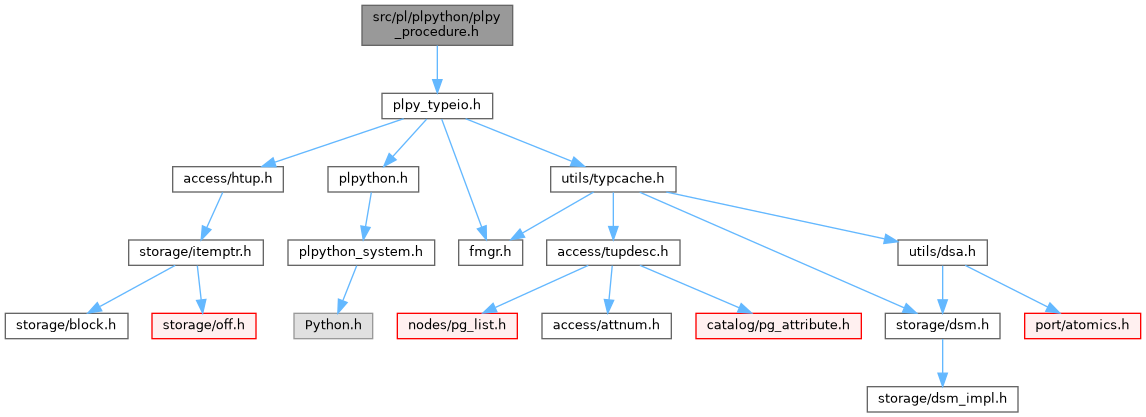#include "plpy_typeio.h"

Go to the source code of this file.
Data Structures | |
| struct | PLySavedArgs |
| struct | PLyProcedure |
| struct | PLyProcedureKey |
| struct | PLyProcedureEntry |
Typedefs | |
| typedef enum PLyTrigType | PLyTrigType |
| typedef struct PLySavedArgs | PLySavedArgs |
| typedef struct PLyProcedure | PLyProcedure |
| typedef struct PLyProcedureKey | PLyProcedureKey |
| typedef struct PLyProcedureEntry | PLyProcedureEntry |
Enumerations | |
| enum | PLyTrigType { PLPY_TRIGGER , PLPY_EVENT_TRIGGER , PLPY_NOT_TRIGGER } |
Functions | |
| void | init_procedure_caches (void) |
| char * | PLy_procedure_name (PLyProcedure *proc) |
| PLyProcedure * | PLy_procedure_get (Oid fn_oid, Oid fn_rel, PLyTrigType is_trigger) |
| void | PLy_procedure_compile (PLyProcedure *proc, const char *src) |
| void | PLy_procedure_delete (PLyProcedure *proc) |
Typedef Documentation
◆ PLyProcedure
| typedef struct PLyProcedure PLyProcedure |
◆ PLyProcedureEntry
◆ PLyProcedureKey
◆ PLySavedArgs
| typedef struct PLySavedArgs PLySavedArgs |
◆ PLyTrigType
Enumeration Type Documentation
◆ PLyTrigType
| Enumerator | |
|---|---|
| PLPY_TRIGGER | |
| PLPY_EVENT_TRIGGER | |
| PLPY_NOT_TRIGGER | |
Definition at line 17 of file plpy_procedure.h.
Function Documentation
◆ init_procedure_caches()
Definition at line 30 of file plpy_procedure.c.
References fb(), HASH_BLOBS, hash_create(), HASH_ELEM, HASHCTL::keysize, and PLy_procedure_cache.
Referenced by _PG_init().
◆ PLy_procedure_compile()
|
extern |
Definition at line 365 of file plpy_procedure.c.
References PLyProcedure::code, elog, ERROR, fb(), PLyProcedure::globals, PLyProcedure::mcxt, MemoryContextStrdup(), NAMEDATALEN, pfree(), PLy_elog, PLy_interp_globals, PLy_procedure_munge_source(), PLyProcedure::proname, PLyProcedure::pyname, snprintf, PLyProcedure::src, and PLyProcedure::statics.
Referenced by plpython3_inline_handler(), and PLy_procedure_create().
◆ PLy_procedure_delete()
|
extern |
Definition at line 419 of file plpy_procedure.c.
References PLyProcedure::code, fb(), PLyProcedure::globals, PLyProcedure::mcxt, MemoryContextDelete(), and PLyProcedure::statics.
Referenced by plpython3_inline_handler(), PLy_procedure_create(), and PLy_procedure_get().
◆ PLy_procedure_get()
|
extern |
Definition at line 71 of file plpy_procedure.c.
References elog, ERROR, fb(), HASH_ENTER, HASH_REMOVE, hash_search(), HeapTupleIsValid, InvalidOid, ObjectIdGetDatum(), PG_CATCH, PG_END_TRY, PG_RE_THROW, PG_TRY, PLPY_TRIGGER, PLy_procedure_cache, PLy_procedure_create(), PLy_procedure_delete(), PLy_procedure_valid(), PLyProcedureEntry::proc, ReleaseSysCache(), and SearchSysCache1().
Referenced by plpython3_call_handler(), and plpython3_validator().
◆ PLy_procedure_name()
|
extern |
Definition at line 46 of file plpy_procedure.c.
References fb(), and PLyProcedure::proname.
Referenced by plpython_error_callback(), and PLy_traceback().